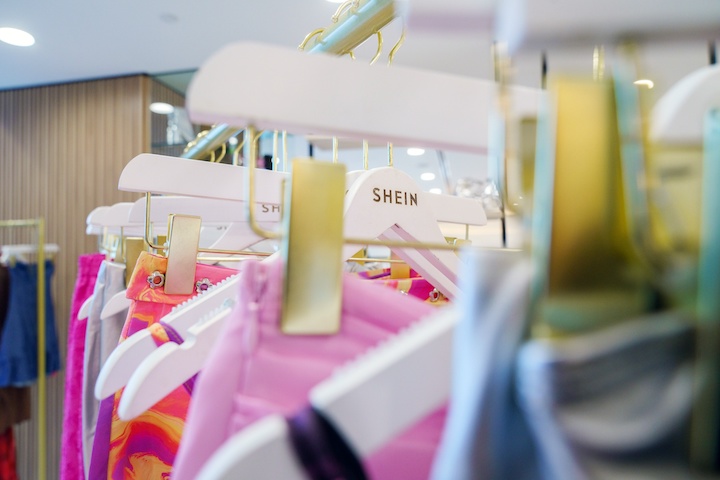US lawmaker seeks Shein sanctions over use of banned cotton
A member of Congress who co-sponsored a law banning products from China’s Xinjiang region is asking a Department of Homeland Security task force to investigate fast-fashion retailer Shein and potentially ban it from the US.
If found to be breaking the law, known as the Uyghur Forced Labor Prevention Act (UFLPA), Shein could be placed on a list of violators and its products would then be barred from entering the US. Its US sales are currently on track to surpass $10 billion this year, according to a person familiar with the company’s operations.
The letter, written by Virginia Democratic Representative Jennifer Wexton and viewed by Bloomberg News, is addressed to the multi-agency Forced Labor Enforcement Task Force (FLETF), a DHS-chaired body that sanctions companies and prohibits them from selling products in the US made with forced labor. Wexton cited testing by Bloomberg last year that found Shein to be using cotton from Xinjiang, along with the company’s own acknowledgment that 2% of its cotton comes from that region.
Shein denies using forced labor, but the UFLPA designates all products from Xinjiang under that category because of human rights abuses against the minority Uyghur population. The Chinese government denies there is repression of ethnic minorities in the region.

“I believe it is wholly appropriate and imperative for FLETF to initiate an investigation of Shein for potential violations of the UFLPA,” Wexton wrote in the letter dated Sept. 28. If Shein is found to be violating the law, she said the agency should place it on the sanctions list and “prohibit the company from exporting products to the United States.”
The letter said that the company’s executive chairman, Donald Tang, who relocated to Washington in July, met with her staff and said that Xinjiang cotton was co-mingled with cotton from elsewhere in its supply chain, backing up Bloomberg’s testing. Shein has pledged to eliminate Xinjiang cotton from its products.
In an email, Shein said it “has a zero-tolerance policy for forced labor. We take visibility across our entire supply chain seriously, and we are committed to respecting human rights and adhering to local laws in each and every market we operate in.”
The company said it requires contract manufacturers to source cotton “from approved regions outside of China” and is looking to engage with Wexton and her staff as well as other stakeholders.
Wexton’s letter asked DHS for a response within 30 days. A spokesperson for Wexton’s office said DHS hadn’t yet replied and declined to comment further.
A spokesperson for DHS said the agency “responds to Congressional correspondence directly via official channels,” and that it “will continue to respond appropriately to Congressional oversight.”
DHS has placed 38 Chinese companies on the list of violators, banning their products from entering the US, including Ninestar Corp., the owner of Lexmark printers and a maker of printer cartridges. After the designation, Lexmark changed suppliers.
Founded in China more than a decade ago, Shein recently moved its headquarters to Singapore and has worked to distance itself from its country of origin. Its direct-to-consumer business, driven by online sales, took off in the US during Covid, and the company quickly became one of the most downloaded shopping apps in the US, targeting teens and young women. Shein still gets most of its clothing for the US from suppliers in southern China, though it has announced plans to source from other countries.
Shein has previously indicated it would like to seek an initial public offering in the US, hiring Goldman Sachs Group Inc. and other investment banks in 2020. Investors including Sequoia Capital China, Tiger Global and IDG Capital are seeking to recoup the years of investment they’ve put into building Shein into the world’s largest online fast-fashion retailer. The company’s global sales last year were $22.7 billion.
Growing Presence
As Shein’s US presence has grown, lawmakers from both parties have expressed concerns about forced labor, underscoring the company’s need to improve its image in Washington if it’s to proceed with plans for an offering. Shein hired two lobbyists earlier this year for this purpose. In the third quarter, it spent $680,000 on lobbying.
Wexton, who isn’t seeking re-election, is also co-author of a letter to Securities and Exchange Commission Chair Gary Gensler in May asking the agency to require Shein to prove its supply chain is free of forced labor before approving any Shein IPO application. She is the sponsor of a bill that would amend the Securities Act of 1934 to require all foreign companies that publicly trade in the US to prove they are free of forced labor.
Similar Stories
NABTU Statement on Trump-Vance Inauguration
“North America’s Building Trades Unions congratulate President Donald J. Trump on his inauguration as the 47th President of the United States of America and Vice President JD Vance as the…
View Article
Alleima relaunches high-strength and corrosion-resistant steel for sustainable energy sectors
View Article
November 2024 Freight Transportation Services Index
View ArticleViet Nam hosts 16th United Nations Conference on Trade and Development In October 2025
UN Trade and Development (UNCTAD) Secretary-General Rebeca Grynspan announced today that the sixteenth session of the United Nations Conference on Trade and Development (UNCTAD 16) will take place in Viet…
View ArticleUnited States and Norway issue innovative report creating greater transparency in critical mineral supply chains
Today, the U.S. Department of Commerce and the Norwegian Ministry of Trade, Industry, and Fisheries issued a thorough, innovative report presenting our shared understanding of non-market policies and practices (NMPPs)…
View ArticleDecember CNBC/NRF retail monitor results show strong growth boosted by final Thanksgiving weekend days
Retail sales jumped strongly in December, boosted in part by two busy holiday shopping days during Thanksgiving weekend falling in the final month of the year, according to the CNBC/NRF…
View ArticleGet the most up-to-date trending news!
SubscribeIndustry updates and weekly newsletter direct to your inbox!





